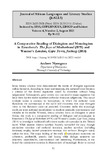| dc.contributor.author | Nyongesa, Andrew W. | |
| dc.date.accessioned | 2023-08-30T07:36:12Z | |
| dc.date.available | 2023-08-30T07:36:12Z | |
| dc.date.issued | 2023-08 | |
| dc.identifier.citation | JoALLS, Volume 4, Number 2, August 2023, Pp 91-112 | en_US |
| dc.identifier.issn | 2633-2116 | |
| dc.identifier.uri | https://journals.co.za/doi/epdf/10.31920/2633-2116/2023/v4n2a5 | |
| dc.identifier.uri | http://hdl.handle.net/123456789/6391 | |
| dc.description.abstract | Many literary scholars have demonstrated the merits of divergent arguments within the novel. According to these conversations, the authorial voice becomes a witness of the diverse arguments raised by characters without being judgemental. Subsequently, great writers may not resolve major arguments but leave them for the reader to reflect and make their own judgements. This use of multiple voices is contrary to homophony in which the authorial voice dominates the conversation in the novel and characters that raise divergent views to this dominant voice are punished. Characters under this monologic mode are mere authorial mouthpieces to inculcate particular conversations and attitudes in the reader. Whereas, literary scholars focus on dialogism in prose fiction, this study is a comparative reading of dialogism and monologism in Emecheta’s The Joys of Motherhood (1979) and Wanner’s London, Cape Town, Jorburg (2014) to investigate traditional and current modes of expression in the African novel. While pioneer African novelists basically controlled the story through omniscient narration and authorial intrusion, modern novelists (including feminists) employ limited omniscient narrators that embrace divergent voices within the texts. The major finding of the study is that homophonic narratives are subjective, predictable, preachy and boring while dialogic narratives are objective, unpredictable, conversational and interesting. Furthermore, it was found that omniscient narration is characteristic of monologic desire to control the dominant voice in a novel while first person and limited omniscient narration are pointers to dialogism. The ideas of Mikhail Bakhtin will form the theoretical basis of interpretation. | en_US |
| dc.language.iso | en | en_US |
| dc.publisher | Sabinet African Journals | en_US |
| dc.subject | African Literature, Dialogism, Feminist Narratives, Homophony, Polyphony | en_US |
| dc.title | A Comparative Reading of Dialogism and Monologism in Emecheta’s The Joys of Motherhood (1979) and Wanner’s London, Cape Town, Jorburg (2014) | en_US |
| dc.type | Article | en_US |

